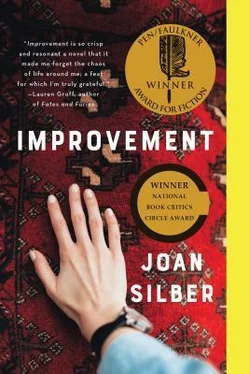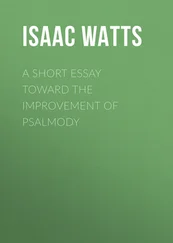“Who would’ve caught me, who’d bother?” he said.
“Someone,” she said.
And sometimes Dieter had dreams about this—a prison that was a tunnel with walls of slime, a path he couldn’t turn around in, and a woman calling out to him from another room.
Dieter was in his fifties when he traveled to America for the first time. A client had hired him to design the logo and signage for a new hotel not yet built, and there was some feeling that he had to see its setting. What a jumble New York was, on first sight. Did no one pick up those piles of garbage? He was told the city had improved greatly. But wasn’t Midtown an expensive neighborhood? He was there in July, and the streets smelled of rot in the heat.
He wondered if Kiki the American had stayed in Turkey all this time or if she’d come back to New York by now. She wasn’t still on the farm; he didn’t think so. If he ever met her, he would show her the pictures of his children. Max was studying history; Silke wanted to be a dancer. In their pictures they looked very alive, with bright eyes and rumpled scarves and open faces. Gisela looked wonderful too—older, more angular, and now with wine-red hair, a change she’d begun as defiance. When the chemo made her hair fall out and it grew back in chunks, she went auburn. Her hair was longer now, an aureole of jagged fuzz, still punk maroon.
She’d been in New York when she was young, and she told him, “Anything goes there. If you walk out naked it won’t get any attention.”
“You did that?”
“Not quite,” she said.
Bruno had told him New Yorkers gave spectacular parties. Bruno looked more ravaged than ever, though he was probably going to live longer than Gisela. Bruno had gotten a second wind after the Berlin Wall fell; there were bars now that didn’t know him, an influx of foreigners with nothing against him. “Even the dirt is sexy in New York,” he said to Dieter.
Dieter was not in what anyone would call a party mood. He had been very reluctant to leave Gisela, despite her claims that she felt fine and needed no tending. He missed her during every meal he ate alone and he was phoning her too often. And he hated the hours with the clients, who were too American, too childish in their showing off. The summer heat beat down meanly on him whenever he walked outside. On his free day he had the sense to retreat to a museum, waiting for the art, any art, to help him with ideas. American air-conditioning was really very good.
His best moment was when he walked up the majestic stairway to the second floor of the Met; he loved the glorious spaces of old exhibition halls. Not that they knew about old here, with buildings always being blasted and rebuilt higher. How did people in this city keep track of themselves, with so much coming at them at once? No wonder Kiki had told him she liked the quiet in Turkey. He thought the lettering he designed for the hotel should actually look dense and busy and excited.
The galleries of Ancient Near Eastern Art very conveniently had a case displaying writing and alphabets. Silver ingots with raised hieroglyphics on them, quartzite cylindrical seals to roll out letters. There was even a cuneiform tablet, circa fourteenth to thirteenth century bc, very much like the one they’d bargained for so ineptly in Turkey. It had the top three rows of writing with a line under them, as theirs had, and it even had a chipped corner curved like a ski slope. Maybe it was their piece. It was the record of a lawsuit—someone had been able to read it. hittite middle kingdom, provenance central anatolia, purchased 1985. Could it be theirs? The more he looked, the more he thought so.
Museums weren’t always so careful who they bought from. He’d missed out on getting whatever sum it was sold for—but he did feel proud to see it. He wanted to tell Steffi, who’d done the bargaining, who’d given her gold locket for it. (Not that he knew where Steffi was.) Hey, it was a good piece after all , he’d say to her. Would she care? What was important? Look at all this labeled debris. All things faded and crumbled and came to dust—he was in a museum of immaculate dust—and nothing was exactly gone. This wasn’t even comforting but it seemed apparent to him.
The tablet was becoming more familiar by the second and also more handsome as an object. He was feeling very fond of all these shards and beads and bowls on display, these fragments and remnants. What touching little pieces of human effort they were, all of them, the tablet with its careful grooves listing some petulant lawsuit. How fragile.
He was sorry he couldn’t touch it, couldn’t unlock the vitrine and feel the marks in the clay. He remembered Kiki, when they first showed her one of the amphorae—how afraid she was to let her hand even graze it, how reverent she was about its age. If she lived in New York, as she very well might, she probably came here—these galleries would draw her, after all those years in Turkey. Maybe she’d gazed at the tablet many times and admired it—it was a thing she’d admire, it was quite amazing—without knowing at all he ever had anything to do with it. How could she know? The thought made him feel quite happily modest.
Monika was amazed at what Hurricane Sandy did to New York. The sheer sound of the wind was like nothing she’d heard before. Her friends from Europe sent her worried emails (they thought New York was a disaster zone anyway). Monika made fun of their messages. “They thought I was swimming in the subway,” she told Lynnette. “I did almost have to move a tree that fell in front of my building. It took them a week to come get it.”
“City would’ve heard from me if it took that long,” Lynnette said. “And I would’ve gotten the TV news on them too.”
For the past few years Monika had been going to Lynnette to get her eyebrows shaped. The waxing and plucking took longer than it should have, but she’d become a big fan of Lynnette’s personality. Lynnette had stories—about boyfriends, bosses, random passersby—and the moral of all of these stories was that nobody fucked with her. “Got to set people straight,” she said. Monika, who was not like this herself, always left the salon with the bracing feeling that she was in fact exactly like this.
Today Lynnette was going on about certain people who wanted credit for doing nothing special. “They think they’re saints. And everybody else is trash.” This referred, it turned out, to the woman who’d been seeing Lynnette’s ex and now was visiting him weekly in a “facility.” “Like she should get a medal for that.”
Monika knew the facility was jail. Three weeks ago, Lynnette had mouthed the word “Rikers” when she’d had to explain a story she’d gone too far in. People tended to tell Monika things. She was in her early thirties now, and she looked (even with superb eyebrows) very reliable, which she was.
She had her eyes closed, while Lynnette, with professional deftness, stroked on the wax. One of the other patrons had said that Lynnette was an artist, a bit of hyperbole Monika never echoed because she was, in her working life, an art historian. She worked part-time at the Met now and had almost managed to explain to Lynnette just what she did: provenance research, which meant figuring out which objects in the museum’s collection had been stolen. She was extra qualified because her first language was German, and the art she was charged with investigating had been moved around during the Nazi era. She was supposed to find and read records of seized property, pore over dealers’ sales, see the patterns of smugglers.
“Are you like a cop?” Lynnette said.
“We don’t put people in jail. The criminals are mostly dead.”
“Why do you do it then?”
Читать дальше












